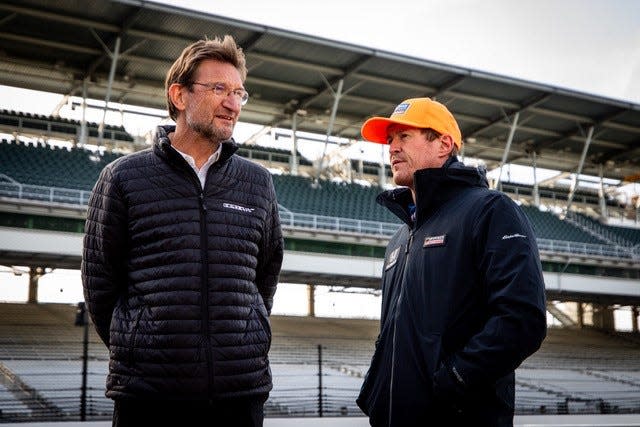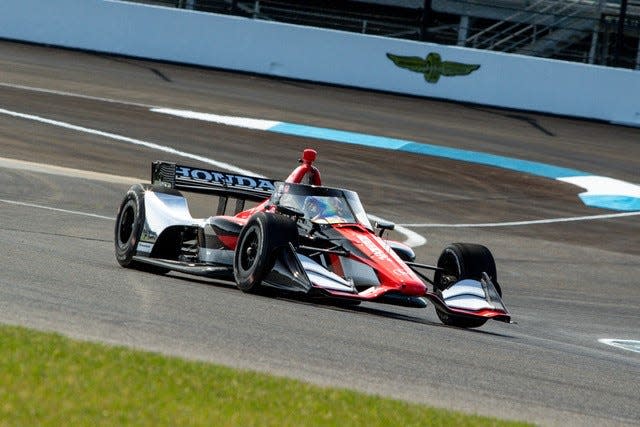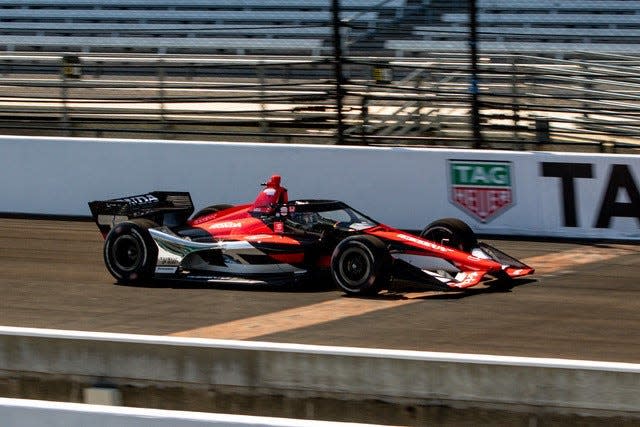Cool temps limit Honda, Chevy during inaugural test of new IndyCar engine at IMS
Despite air temperatures that hovered around 40 degrees in Indianapolis on Monday afternoon, Honda and Chevy managed to turn the first laps of the 2.4-liter twin-turbo V6 IndyCar engine era at the Indianapolis Motor Speedway.
Chip Ganassi Racing's Scott Dixon and Team Penske's Josef Newgarden took the reins for Honda and Chevy, respectively, but instead of a full day of running as planned on the modified version of the IMS road course (different than teams will race twice this season), Honda and Chevy were forced to wait until the afternoon to even run install laps at low speeds. In order to run full bore, cars typically need 100 degrees combined from ambient and track temperature to be certain the Firestone tires are at their optimum grip levels.

Newgarden took the track first, followed by Dixon, with very little "at speed" running completed with the hopes that fractionally-warmer weather Tuesday will allow for temperatures within cars' typical running windows. This week's test was originally scheduled for Wednesday and Thursday in Sebring, Fla., but was shifted to IMS with earlier dates because of the IMS road course test Thursday, that includes more of the full-time field.
Both cars were without the vital energy recovery component that will take these larger-displacement engines into IndyCar's new hybrid era and give them peak horsepower levels around 900. Those KERS units, which gather energy during cars' braking into a pool drivers will be able to use throughout races to replace the current push-to-pass system, have yet to be fully manufactured and delivered due to global supply chain issues. Weeks ago, the delay ultimately forced IndyCar, in agreement with both engine manufacturers, to push back the debut of this new engine formula for a third time to 2024.
IndyCar hybrid engine: IndyCar delays new hybrid engine package to 2024 amid supply chain issues
The hybrid components are expected to be ready for testing by the summer, but should there be any further delays in delivery or the testing process, IndyCar would have risked not having the new engines ready for teams to run, while also not giving Honda and Chevy enough time to prepare enough 2.2-liter versions before next season.

The decision, announced earlier this month, left Honda and Chevy to work out the kinks in the larger radiators and other engine-related systems and sensors that have been fitted to the current Dallara chassis on Monday. Warmer temperatures, either this week or later down the line, will allow both OEMs to give the engine packages a more rigorous load to fully test their limits.
No issues were reported from Monday's initial -- albeit restricted -- runs.
The latest IndyCar news:
Insider: IndyCar's return to Texas is uncertain; Charlotte, COTA possible additions
IndyCar's Texas TV ratings 'better than average' up against 2021 NBC races
Penske, Ganassi leave Texas on a high; Andretti, Rahal, AMSP left with questions
Insider: How IndyCar's performance at Texas proved it's worth another chance
"This is an important step for HPD, Honda and IndyCar as the series moves into the electrified era, and it was a successful day," Honda Performance Development president and technical director David Salters said in a release. "But there are many more steps to take before the full hybrid power unit debuts in 2024. The 2.4-liter engine is an all-new design that has been fully developed, dyno-tested and manufactured by the great men and women at HPD.
"There is still a very, very long list of things to be accomplished before the the power unit is tested in competition, but this is certainly a milestone for everyone at Honda and HPD."

Day 2 of testing is scheduled for Tuesday at the IMS road course, with Newgarden's Penske teammate Will Power, as well as Dixon, taking the wheel. Tuesday's high in Indianapolis is projected at 44 degrees, still on the borderline of allowing for truly usable track time. Wednesday could be utilized as a backup date, with temperatures expected to rise to around 70 degrees, though storms are expected in the afternoon.
Email IndyStar motor sports reporter Nathan Brown at nlbrown@gannett.com. Follow him on Twitter: @By_NathanBrown.
This article originally appeared on Indianapolis Star: IndyCar: Honda, Chevy limited in Day 1 of new engine testing at IMS
